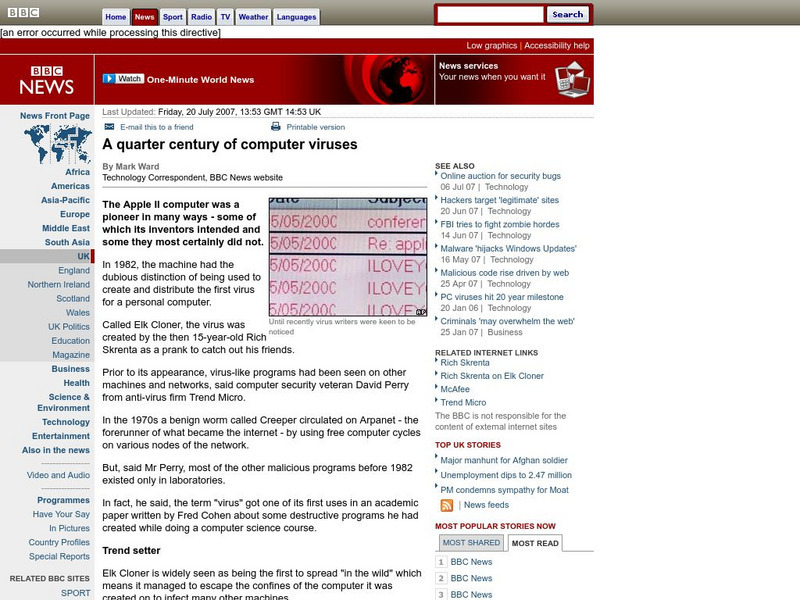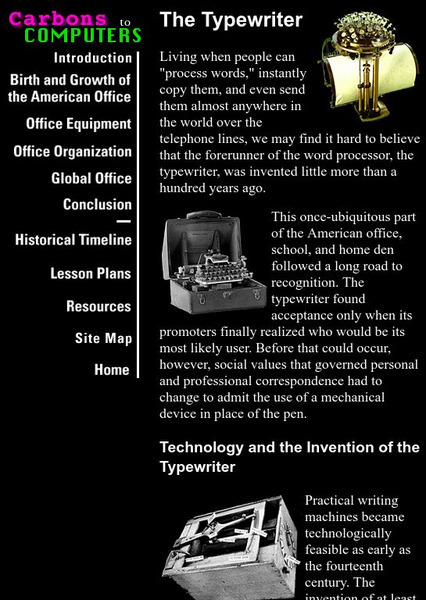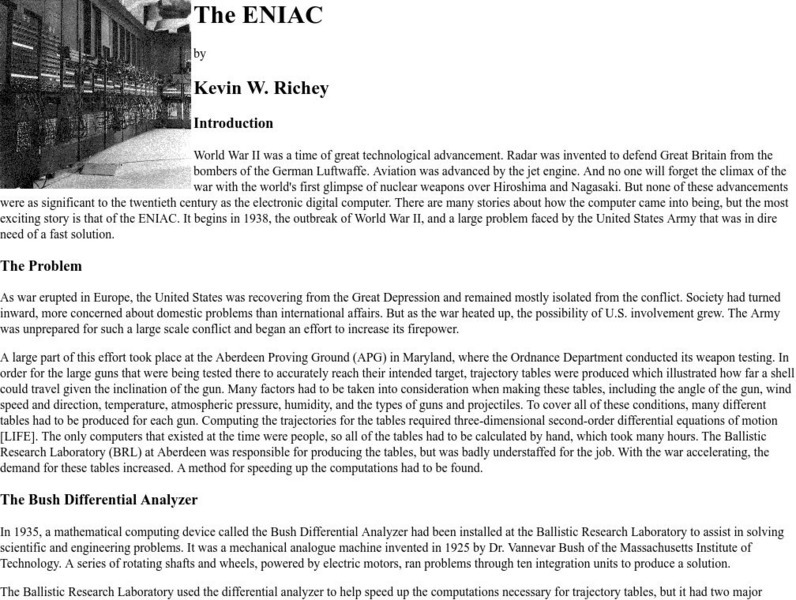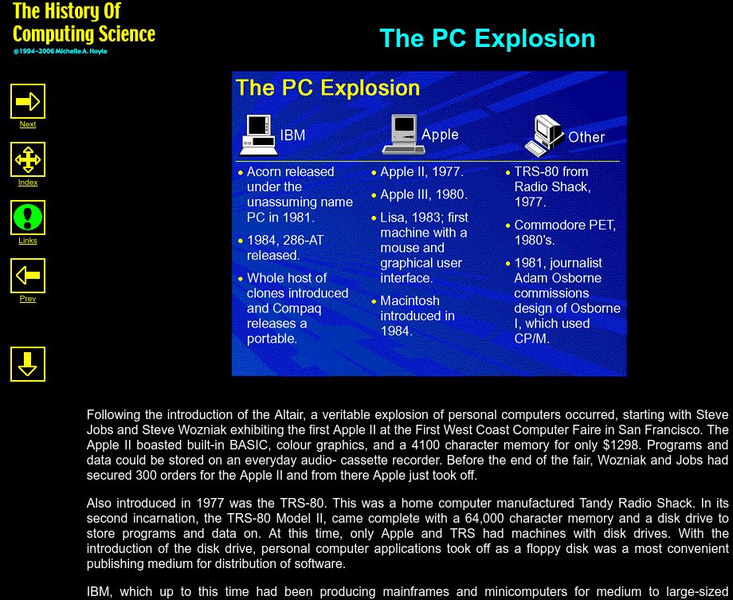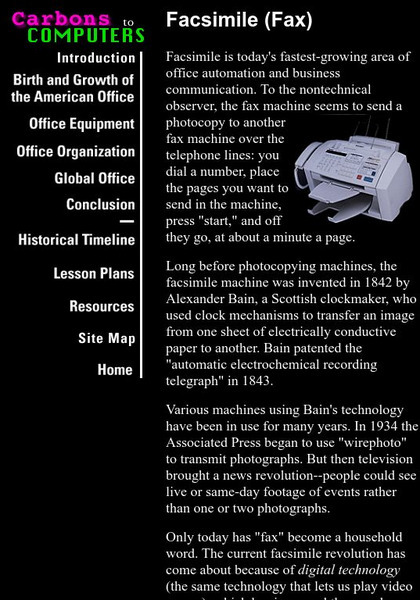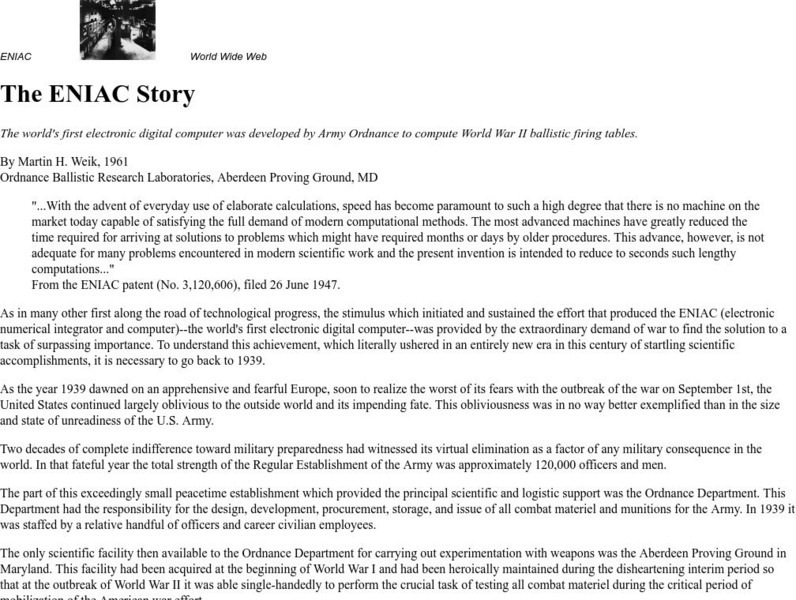The Franklin Institute
Franklin Institute: The Case Files: Early History of Computing
Computers are ubiquitous today. Step back in time and meet some of the early inventors of precursors to computers, and of the first computers.
Other
A Brief History of Computers and Networks
Provides historical information on computers and networks, from the beginning of mechanical calculators in the 1640's to modern times.
Computer Hope
Computer Hope: Information About Computer Floppy Drives
Informative site detailing the use of computer floppy dirves. Content includes a focus on floppy drive ABCs, floppy history, floppy cable, creating a floppy boot disk, floppy disk definitions, and coverage of 3.5 and 5 1/4 floppy diskettes.
BBC
Bbc: Science & Nature Hot Topics Computer Viruses
This BBC "hot topic" contains a description of the types of computer viruses. It also provides different ways to prevent or eliminate computer viruses.
Smithsonian Institution
Smithsonian Education: Carbons to Computers: The Typewriter
Created a little less than 150 years ago, the typewriter was the forerunner for the computer. This page offers a detailed history of the birth of the typewriter along with several visual examples.
TED Talks
Ted: Ted Ed: A Brief History of Video Games (Part I)
Video games are everywhere these days, but where did they actually come from? The history of video games is a complicated story that involves giant computers in science labs, the founder of Chuck E. Cheese and billions of dollars in...
University of Minnesota
University of Minnesota Charles Babbage Institute: Who Was Charles Babbage?
This is a biographical note on Charles Babbage, computer pioneer, and includes a list of his published works.
Harvard University
Harvard University: Howard Aiken: Makin' a Computer Wonder
About Howard Aiken's mission to build the first programmable computer.
Computer History Museum
Computer History Museum: Charles Babbage
Considered by some to be the "father of the computer", Charles Babbage was a 'gentleman scientist'. Learn interesting facts about his personal life and his career.
Other
The History of Programming Languages
Brief history of programming languages is provided in this research paper at this site.
National High Magnetic Field Laboratory
Magnet Academy: Magnetic Core Memory 1949
At the dawn of the computer age, magnetic core memory helped make data storage possible, and showed surprising staying power in a field where components are constantly being replaced by new and improved products.
Great Idea Finder
The Great Idea Finder: Computer Mouse
A short article about the computer mouse and the inventor, Douglas Engelbart.
National Women’s History Museum
National Women's History Museum: The Women of Nasa
Learn about the women who have played an essential role in the functions of NASA for almost a century.
Other
The Apple Museum
The Apple Museum provides in depth information on the history of the Apple company and its products. Contributing to this information are articles written in reference to the company and/or its products. Code names, video clips, specs...
Virginia Tech
Virginia Tech: The Eniac
This site has the description and history of the ENIAC, including its development and use in World War II.
Rock and Roll Hall of Fame
Rock & Roll Hall of Fame: Sti Lesson 15: The Changing American Landscape
The rise of American cities between 1865 and 1900 was spawned by the industrial revolution. Technological advancements in industry and transportation fathered the enormous growth of large cities across the United States. This led to the...
History of Computing Science
History of Computing Science: P Cs Today
The personal computer (PC) has become a common fixture in virtually every home, business and classroom. This lecture series describes the history of the personal computer.
University of St. Andrews (UK)
University of St. Andrews: St. Andrews: History of the Four Color Theorem
The University of St. Andrews offers a brief history of the first math problem to be solved with computers.
History of Computing Science
History of Computing Science: Charles Babbage
This is a brief biography of Charles Babbage, also known as the "Father of Computing".
Smithsonian Institution
Smithsonian Education: Carbons to Computers Fax
The Smithsonian Institution provides the lifeline of the fax machine and of its uses in the business world.
Other
U. S. Army Research Laboratory: The Eniac Story
This site provides a detailed history of ENIAC, the world's first digital computer developed by Army Ordnance to compute World War II ballistic firing tables. Includes specifics on how the computer performed its calculations.
PBS
Pbs Learning Media: Technology Over Time
In this interactive activity adapted from A Science Odyssey, learn how technology in the home has changed through the years. Scroll through a timeline from 1900 to 2010 to explore technological innovations in the home (such as...
National High Magnetic Field Laboratory
Magnet Academy: Timeline of Electricity and Magnetism: 1940 1959
Defense-related research leads to the computer, the world enters the atomic age and TV conquers America.
National High Magnetic Field Laboratory
Magnet Academy: Timeline of Electricity and Magnetism: 1960 1979
Computers evolve into PCs, researchers discover one new subatomic particle after another and the space age gives our psyches and science a new context.


